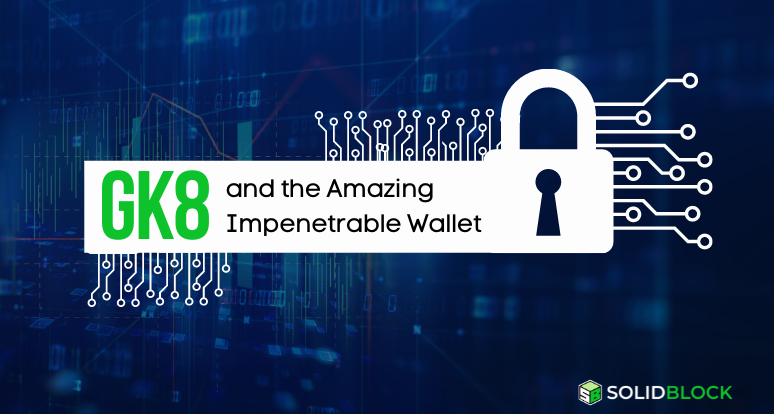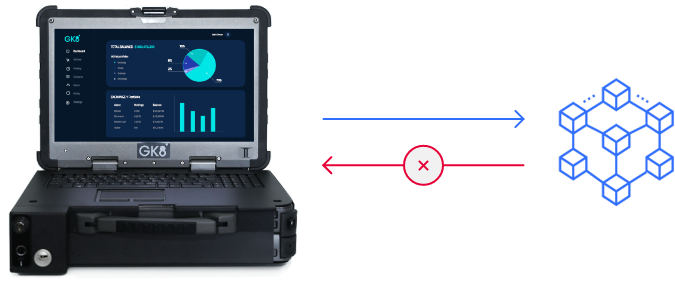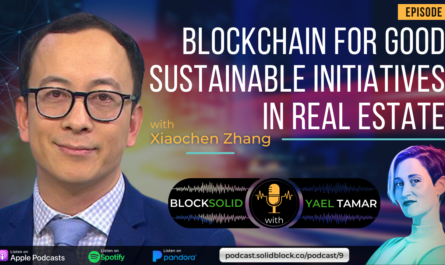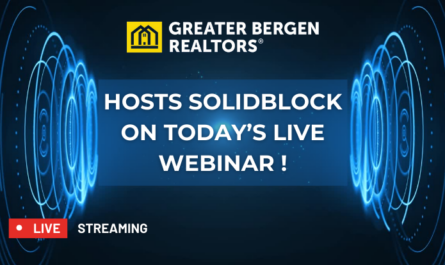
A Bible Story
Here’s the really good news: When you invest with SolidBlock, the process of opening a crypto wallet is so seamless, user-friendly, and secure that you won’t even have to worry about it. That’s because we’ve partnered with GK8, a custodial solution provider like no other. Its self-managed platform comes with access to the highest insurance coverage on digital assets in the market, and its name has more than a ring to it.
On the latest episode of our BlockSolid podcast, May Michelson, GK8’s Senior Director of Global Sales, joined SolidBlock’s CEO Yael Tamar to shed light on the company’s know-how. GK8, she explained, refers to Genesis 11:8, the story of the Tower of Babel. Remember that from Bible class?
Here’s May’s short explanation: As many people are trying to build a tower to the heavens to reach God, God confounds their progress by making them all speak different languages so they can’t communicate with each other, and they disperse, abandoning their plan. In itself, the story teaches us about unity and the sin of pride. And when we extrapolate verse 8 (which refers to the idea of man being unable to achieve his goal), we realize the GK8 wallet will scatter hackers, foiling their plots, the same way God scattered the tower builders!
SolidBlock’s Users and GK8
Investing in the SolidBlock digital marketplace means your assets will be protected by GK8’s custodial platform.
Using cutting-edge technology, GK8 provides the security of an air-gapped cold vault with the flexibility of a hot MPC wallet. Their Cold Vault enables the user to sign off transactions without having to ever connect to the internet, which is a feature that other cold solutions in the market lack. In cybersecurity terms, this is known as the “air gap”, which refers to the fact that the protected device is physically isolated from unsecured networks.
GK8’s solution also includes a multi-party computation (MPC) hot wallet, which enables secure live transactions with crypto. MPC wallets rely on multiple parties, most of them cloud-based, to sign off every transaction, making it harder for hackers to compromise the system. The scalability that GK8’s MPC brings to the table allows its clients to make their hot wallets as secure as it gets.
GK8 prides itself on its security, with founders and the majority of the R&D team being veterans of Israel’s elite cyber-security units. In February 2020, GK8 challenged the world to break into their cold vault, offering a bounty of $250K to any who succeeded. Thousands of hackers from all over the world took a stab at breaching the cold vault, but the vault remained “sealed”.
And this November, GK8 was acquired by Celsius, a powerhouse crypto lending and banking company, still remaining an independent entity.
Regulating DeFi
We often talk about a decentralized financial system where individuals are free to “be their own bank.” DeFi is the process of decoupling ourselves from a centralized system using blockchain technology and smart contracts that allow us to trade cryptocurrencies and tokens peer-to-peer. We bypass the banks, save time and resources (no paperwork!), cut out the middlemen, rely on the transparency, security and immutability of blockchain, and stop worrying about whether banks will support our loan request.
And yet, as a society, we are bound by rules and regulations that keep our communities running smoothly. We want to ensure trust within our business dealings, gravitating towards providers of secure and honest services. We seek to stabilize the volatility of an unpredictable financial market.
In December 2021, Meta, the new Facebook, recently lifted a ban on the advertising of crypto businesses because “the cryptocurrency landscape has continued to mature and stabilize in recent years and has seen more government regulations that are setting clearer rules for their industry.”
Take SolidBlock, for example. In order to preserve honesty in our transactions, all our customers must receive accreditation by passing a KYC/AML (know your customer/anti-money laundering) check. Plus, in order to list our primary real estate projects on our marketplace, we require SEC approval. That’s the US Securities and Exchange Commission, whose purpose is to enforce the law prohibiting market manipulation.
As DeFi becomes more mainstream, companies like Celsius create a bank that offers services so we can maintain our financial freedoms. Ironic, no? A decentralized centralized service? Then they acquire a company like GK8 to guarantee their customers receive the best and most secure money-retention services available. In essence, we are regulating aspects of DeFi to ensure that individuals are safeguarded against fraud, theft, and unscrupulous players.
What’s a Crypto Wallet?
Which leads us back to the need to define a crypto wallet, and what features make it secure?
The idea is simple. Your trusty wallet holds your money and coins (and photos and scraps of paper, or even a reminder that today is your anniversary!). A virtual wallet, though, does not exactly hold your coins and tokens, as those live on the blockchain, but enables you to receive and send them much like from a bank account. What they do have in common, though, is the variety. Just as you need to shop for a wallet that appeals to your personal tastes and will endure being shoved into your back pocket on a daily basis, there are also many crypto wallets to choose from.
Generally speaking, we’re talking about a device or app that stores and retrieves the private key you use to manage your digital assets. Your wallet may also allow for other functions, such as encryption of information and a secure signing capacity.
There are “hot” wallets, which are online and convenient when engaging in transactions, though also vulnerable to theft or computer failure, while “cold” wallets are offline and, conversely, more safely store your crypto coins.
Here’s the issue that GK8 has managed to correct. When issuing transfer instructions from your offline cold wallet, you still need to connect it to the internet to sign off the transaction with your private key, which kind of defeats the whole “coldness” of the wallet in the first place. And GK8’s air-gapped cold wallet prevents this, while still allowing you to create, sign, and send blockchain transactions, all with no internet connection. Cool, right?!

Wallets can also keep track of your balance, and can be used with a bitcoin debit card, a real card translating between crypto, dollars, and other currencies, allowing for monetary transactions in real-time visits to malls or other public spaces.
Five Elements of a Safe Wallet
To understand how digital wallets work, here are five main characteristics of an effective wallet:
1. Security
If you own cryptocurrencies, you’ll want to ensure your money is safely stored. When you trade or make crypto transactions, use only secure internet connections and avoid public Wi-Fi networks. Use a VPN for additional security, even when you’re accessing your home network. A virtual private network disguises your IP address and location, keeping your browsing activity safe and private from active threats. Also check the wallet for multi-factor authentication, which grants users access only after successfully presenting two or more pieces of identifying evidence. An ancillary security aspect is the multi-signature option, meaning more than one virtual key is needed to authorize a transaction. The best analogy is to think of your wallet as a safe where it takes two parties with two separate keys to open it.
2. Own your keys
Having control of the private keys or addresses to your wallet means having control over your cryptocurrencies. You’ll be able to move your crypto in and out of your wallet at any time, and back up your wallet when needed. Choose a wallet where you are the keeper of the keys.
3. HD wallets are an advantage
Most wallets have a public address the user can give to others to receive funds and a private address for authorizing the spending of funds. A Hierarchical Deterministic, or HD, wallet automatically generates the addresses or keys to allow these transactions to happen and does so in a very versatile manner, where keys can be used to generate more keys, like branches winding off a tree. This removes the constant need by the wallet owner to generate addresses and, more importantly, the keys are generated in a more timely fashion.
4. The company’s reputation
The best way to investigate a crypto wallet company is through customer reviews. Has the company defended its clients from hackers? Is it easy to use? Are the instructions user-friendly? Does it work effectively on your mobile phone? Use these peer-to-peer reviews to determine the company’s reputation.
5. Transparency and anonymity
Make sure your wallet provider secures your money by operating transparently with open source code that can be checked for vulnerabilities. Also, check the registration process needed to use your wallet. Is there a user verification process like KYC (Know Your Customer), or just a minimal registration process with an email?
It’s perfectly normal for one individual to own and operate several digital wallets at the same time, just as we might open more than one bank account in more than one bank.
Ultimately, based on the factors listed above, the choice of which wallet to use to secure your cryptocurrency is up to you. We invite you to invest in the SolidBlock digital marketplace and place your new tokens in your GK8 crypto wallet.
Watch the full interview with May Michelson, GK8’s Senior Director of Global Sales.

 by
by 

